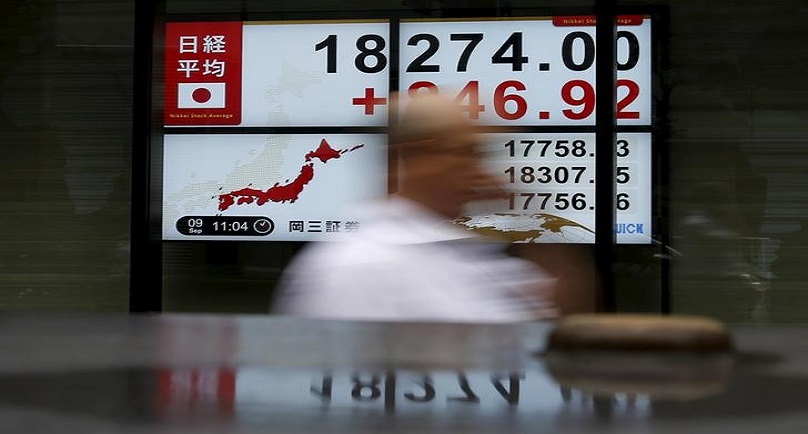Image: A pedestrian walks past electronic boards showing the Japan’s Nikkei average outside a brokerage in Tokyo, Japan, September 9, 2015. REUTERS/Yuya Shino
By Shinichi Saoshiro
TOKYO (Reuters) – Asian stocks slipped on Thursday as weak oil prices continued to feed global growth worries, while the euro held solid gains after a policymaker poured cold water on market expectations of more easing by the European Central Bank.
MSCI’s broadest index of Asia-Pacific shares outside Japan <.MIAPJ0000PUS> lost 0.2 percent.
Japan’s Nikkei <.N225> fell 1 percent to hit a 1-month low and Australian shares <.AXJO> dropped 0.8 percent. South Korea’s Kospi <.KS11> dipped 0.2 percent.
Risk asset markets continued to take cues from crude oil, which cooled investor sentiment by resuming its decline on a build in stocks of distillates such as fuel oil and diesel. Brent crude
In currencies, the euro fetched $1.1021
A notable mover in Asia was the New Zealand dollar, which soared after the Reserve Bank of New Zealand (RBNZ) early on Thursday cut interest rates but said further easing should not be needed.
The kiwi traded at $0.6722
“Price action following the RBNZ announcement suggests that the bigger surprise was the watering down of the forward guidance and focus on upside risks as opposed to the rate cut,” wrote Todd Elmer, Citi’s Asian head of G10 FX strategy.
“The RBNZ shifted its guidance to say, ‘We expect to achieve this (inflation) at current interest rate settings, although the Bank will reduce rates if circumstances warrant’ marking a moderation in the easing bias.”
The dollar fetched 121.59 yen
With the greenback on the back foot against the euro and yen, the dollar index <.DXY> hovered near a 1-month low of 97.223 struck overnight.
The U.S. currency was hurt as Treasury yields fell on a flight to safety to government debt, prompted by falling oil prices and a decline on Wall Street.
The S&P 500 <.SPX> tracked weaker commodities and lost 0.8 percent on Wednesday, while the Dow <.DJI> lost 0.4 percent and the Nasdaq <.IXIC> shed 1.5 percent.
Highlighting the plight of the broader commodity markets, the Thomson Reuters Core Commodity CRB index <.TRJCRB> hit a fresh 13-year low on Wednesday.
(Reporting by Shinichi Saoshiro; Editing by Eric Meijer)
Copyright 2015 Thomson Reuters. Click for Restrictions.


